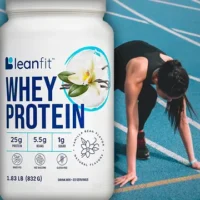Ingredientsprotein ingredient glossary
Folic acidFolacin, Vitamin B9
Folic acid is a synthetic form of vitamin B9 essential for the formation of new cells, proper brain function, and the production of neurotransmitters.
Fructooligosaccharides
Fructooligosaccharides (FOS) are a prebiotic fiber naturally found in certain fruits and vegetables that are added to protein powders to support digestive health and improve gut function by stimulating the growth of beneficial gut bacteria.
FructoseFruit sugar
Fructose is a simple sugar that is naturally found in many fruits. It is used as a sweetener in some protein powders to enhance flavor.
FucoxanthinMarine carotenoid
Fucoxanthin, found in brown seaweed and marine organisms, is added to some protein powders as an antioxidant. It has potential anti-inflammatory and anti-obesity effects, reducing inflammation and promoting weight loss.
Fulvic acidFulvic minerals
Fulvic acid, a naturally occurring organic acid found in soil and water, is added to some protein powders as a source of trace minerals and electrolytes. It can also have potential antioxidant and anti-inflammatory effects.
Fumaric acidTrans-butenedioic acid
Fumaric acid, found in many fruits and vegetables, is added to some protein powders as a source of acidity and preservative.
Gluconic acidD-gluconic acid
Gluconic acid, produced by the fermentation of glucose, is added to some protein powders as a source of acidity and preservative.
Glucono delta-lactone
Glucono delta-lactone (GDL) is a natural acid commonly used in food products, including some protein powders, as a source of acidity to enhance taste.
Glucosamine sulfate
Glucosamine sulfate, a naturally occurring amino sugar found in shellfish and fungi, is used in some protein powders for its potential health benefits. It can act as a natural anti-inflammatory to reduce joint pain and inflammation.
Guar gum
Guar gum, derived from the seeds of the guar plant, is a type of soluble fiber used in some protein powders as a thickening agent to improve texture and mixability.
HesperidinBioflavonoid
Hesperidin, a flavonoid found in citrus fruits, is used in some protein powders as a natural antioxidant and anti-inflammatory agent.
Hyaluronic acid
Hyaluronic acid is a natural substance found in the body and is sometimes added to protein powders for its potential health benefits, including supporting overall health and well-being and improving skin health.
HydroxyapatiteCalcium hydroxyapatite
Hydroxyapatite is a naturally occurring mineral found in bone tissue and teeth, and it is sometimes added to protein powders for its potential health benefits. It is a source of calcium and phosphorus, which are essential minerals for bone health.
Hydroxypropyl cellulose
Hydroxypropyl cellulose is a modified form of cellulose found in plants, and it is used as a stabilizer and thickening agent in various food and cosmetic products, including some protein powders.
Hydroxypropyl methylcellulose
Hydroxypropyl methylcellulose is a modified form of cellulose found in plants and used as a thickening agent, emulsifier, and binder in various food and pharmaceutical products, including some protein powders.
InositolMyo-inositol
Inositol is a naturally occurring carbohydrate found in many foods and sometimes added to protein powders. It is involved in neurotransmitter production, supports healthy liver function, improves insulin sensitivity, and aids in the breakdown of fats.
IodinePotassium iodide
Iodine is a trace element essential for thyroid function, regulating metabolism, growth, and development. It may be added to protein powders as a nutritional supplement, particularly in plant-based sources which may be lower in iodine.
Kaempferol
Kaempferol is a natural flavonoid with antioxidant and anti-inflammatory properties, found in many plants. It can be added to protein powders to improve heart health, support the immune system, and reduce oxidative stress.
Lactase
Lactase is an enzyme that breaks down lactose into glucose and galactose, making it easier to digest milk and dairy products. It can be added to protein powders as a digestive aid, especially for individuals with lactose intolerance.
Lactobacillus acidophilus
Lactobacillus acidophilus is a type of friendly bacteria naturally found in the gut, and may be added to protein powders as a probiotic supplement.
The content on this site has not been written, reviewed or endorsed by a medical professional. We assume no liability for the misuse of supplements and recommend you review the label of any product, as well as consulting with your health care professional.
We are a participant in the Amazon Services LLC Associates Program, an affiliate advertising program designed to provide a means for us to earn fees by linking to Amazon.com and affiliated sites.
We are a participant in the Amazon Services LLC Associates Program, an affiliate advertising program designed to provide a means for us to earn fees by linking to Amazon.com and affiliated sites.
© 2025 ProteinPowder.com




